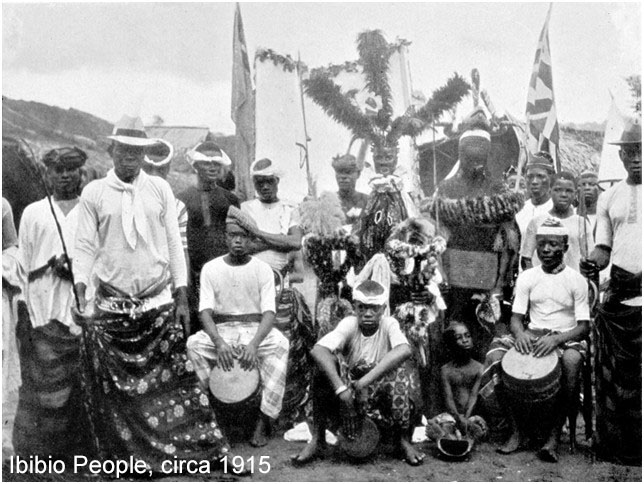The ibibios are regarded as the most ancient of all tribes in Nigeria. Robert McKeon believes that the Ibibio are the indigenous native tribe from which other small tribes like Qua Ibom and Calabar descended from. After the Hausa, Yoruba and Igbo, the Ibibios are considered the 4th largest tribe in Nigeria.

Introduction
Akwa Ibom, a state in the Eastern region of Nigeria, aka Sout Sout, is predominantly occupied by the Ibibio and Annang ethnic groups. These groups, like many others in Nigeria, have a rich cultural and religious heritage that predates the arrival of foreign Abrahamic religions. This article offers a glimpse into the native religion of Akwa Ibom, highlighting the beliefs, practices, and rituals of the Ibibio and Annang people.
1. Belief in a Supreme Being
At the core of Akwa Ibom’s native religion is the belief in a Supreme Being, known as Abasi Ibom among the Ibibio people and Ofon Ikpong among the Annang people. This deity is considered the creator of the universe, the giver of life, and the ultimate source of all that is good and just. Although the Supreme Being is not actively involved in the day-to-day affairs of humans, people seek divine intervention through prayers, offerings, and sacrifices.
2. Ancestral Veneration
Ancestors hold a significant place in the native religion of Akwa Ibom; they are considered intermediaries between the living and the Supreme Being. The Ibibio and Annang people believe that their ancestors possess supernatural powers and can influence the physical world. Consequently, they venerate their ancestors through various rituals and ceremonies, such as the Ekpo masquerade and the Nkuk Ufok (House of Ancestors).
3. Deities and Spirits

The Ibibio and Annang people also believe in a host of deities and spirits that inhabit the natural world. These deities are associated with various elements, such as the earth, rivers, and forests, and are believed to possess specific powers and attributes. People worship these deities to seek protection, blessings, and guidance in their daily lives. Some of the prominent deities in Akwa Ibom’s native religion include Eka Abassi (Goddess of the Earth), Ediene Ikono (Goddess of Fertility), and Ete Nka (God of War).
4. Divination and Healing
Divination and healing practices are essential aspects of the native religion of Akwa Ibom. Traditional priests and priestesses, known as dibias, possess specialized knowledge and skills to communicate with the spirit world. They use various methods, such as the casting of cowrie shells, palm reading, and interpretation of signs and omens, to diagnose illnesses, predict the future, and offer solutions to problems. The use of herbs, roots, and other natural substances for healing purposes is also a common practice.
5. Rituals and Ceremonies
Rituals and ceremonies play a crucial role in the religious life of the Ibibio and Annang people. These events serve as a means of strengthening communal bonds, maintaining social order, and appeasing the deities and ancestors. Some of the most significant ceremonies include the Iwa Akwa (rite of passage for young men), the Mbopo (rite of passage for young women), and the Ekpo and Ekong masquerades.

Conclusion
The native religion of Akwa Ibom offers a fascinating insight into the spiritual worldview of the Ibibio and Annang people. Although Christianity and Islam have gained prominence in the region, many traditional beliefs and practices still persist, and the native religion remains an essential aspect of the cultural identity of the people. The religion has evolved over time, adapting to changes in the social, economic, and political landscape of the region. Nonetheless, it continues to provide a sense of meaning, purpose, and belonging to the people of Akwa Ibom.
In recent years, there has been a growing interest in the preservation and promotion of Akwa Ibom’s native religion, both within and outside the region. Scholars, cultural activists, and religious leaders have called for greater recognition and appreciation of the indigenous knowledge, values, and practices that underpin the religion. They argue that the native religion offers a unique perspective on the relationship between humans, nature, and the divine, and has much to offer in terms of promoting sustainable development, social justice, and intercultural dialogue.
In conclusion, the native religion of Akwa Ibom is a rich and diverse spiritual tradition that reflects the cultural heritage of the Ibibio and Annang people. It embodies a complex system of beliefs, practices, and rituals that provide a framework for understanding the world and navigating the challenges of life. While the religion faces many challenges, including the pressures of modernization and globalization, it remains a vital part of the cultural fabric of Akwa Ibom and deserves greater recognition and respect.
IMAGE: kmacims
Culled from: http://africabib.org / idonsabi.com



